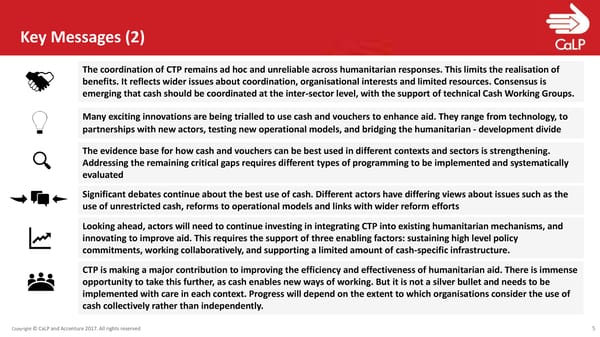Key Messages (2) The coordination of CTP remains ad hoc and unreliable across humanitarian responses. This limits the realisation of benefits. It reflects wider issues about coordination, organisational interests and limited resources. Consensus is emerging that cash should be coordinated at the inter-sector level, with the support of technical Cash Working Groups. Many exciting innovations are being trialled to use cash and vouchers to enhance aid. They range from technology, to partnerships with new actors, testing new operational models, and bridging the humanitarian - development divide The evidence base for how cash and vouchers can be best used in different contexts and sectors is strengthening. Addressing the remaining critical gaps requires different types of programming to be implemented and systematically evaluated Significant debates continue about the best use of cash. Different actors have differing views about issues such as the use of unrestricted cash, reforms to operational models and links with wider reform efforts Looking ahead, actors will need to continue investing in integrating CTP into existing humanitarian mechanisms, and innovating to improve aid. This requires the support of three enabling factors: sustaining high level policy commitments, working collaboratively, and supporting a limited amount of cash-specific infrastructure. CTP is making a major contribution to improving the efficiency and effectiveness of humanitarian aid. There is immense opportunity to take this further, as cash enables new ways of working. But it is not a silver bullet and needs to be implemented with care in each context. Progress will depend on the extent to which organisations consider the use of cash collectively rather than independently. Copyright © CaLPand Accenture 2017. All rights reserved 5
 State of World’s Cash Report | Presentation Page 5 Page 7
State of World’s Cash Report | Presentation Page 5 Page 7